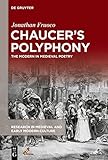Chaucer’s Polyphony : The Modern in Medieval Poetry / Jonathan Fruoco.
Material type: TextSeries: Research in Medieval and Early Modern Culture ; 29Publisher: Kalamazoo, MI : Medieval Institute Publications, [2020]Copyright date: ©2020Description: 1 online resource (XIII, 228 p.)Content type:
TextSeries: Research in Medieval and Early Modern Culture ; 29Publisher: Kalamazoo, MI : Medieval Institute Publications, [2020]Copyright date: ©2020Description: 1 online resource (XIII, 228 p.)Content type: - 9781501518492
- 9781501514043
- 9781501514364
- 821.1 23/eng/20231120
- online - DeGruyter
- Issued also in print.
| Item type | Current library | Call number | URL | Status | Notes | Barcode | |
|---|---|---|---|---|---|---|---|
 eBook
eBook
|
Biblioteca "Angelicum" Pont. Univ. S.Tommaso d'Aquino Nuvola online | online - DeGruyter (Browse shelf(Opens below)) | Online access | Not for loan (Accesso limitato) | Accesso per gli utenti autorizzati / Access for authorized users | (dgr)9781501514364 |
Frontmatter -- Preface -- Contents -- Notes on the Texts and Translations -- Abbreviations of Chaucer’s Works -- Introduction -- Chapter 1. Polyphony and Multilingualism in Medieval England -- Chapter 2. Fin’amor, Stil Novo: Chaucer’s Early Influences -- Chapter 3. Narrative Evolution and New Discursive Strategies -- Chapter 4. Troilus and Criseyde and the Ambiguity of Double Enunciation -- Chapter 5. Hybridization and the Legend of Chaucer’s Inventiveness -- Chapter 6. Extradiegetic Dialogue in The Canterbury Tales -- Conclusion -- Bibliography -- Index
restricted access online access with authorization star
http://purl.org/coar/access_right/c_16ec
Geoffrey Chaucer has long been considered by the critics as the father of English poetry. However, this notion not only tends to forget a huge part of the history of Anglo-Saxon literature but also to ignore the specificities of Chaucer’s style. Indeed, Chaucer’s decision to write in Middle English, in a time when the hegemony of Latin and Old French was undisputed (especially at the court of Edward III and Richard II), was consistent with an intellectual movement that was trying to give back to European vernaculars the prestige necessary to a genuine cultural production, which eventually led to the emergence of romance and of the modern novel. As a result, if Chaucer cannot be thought of as the father of English poetry, he is, however, the father of English prose and one of the main artisans of what Mikhail Bakhtin called the polyphonic novel.
Issued also in print.
Mode of access: Internet via World Wide Web.
In English.
Description based on online resource; title from PDF title page (publisher's Web site, viewed 25. Jun 2024)


